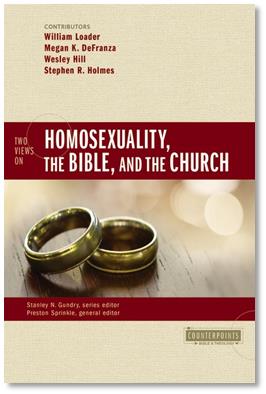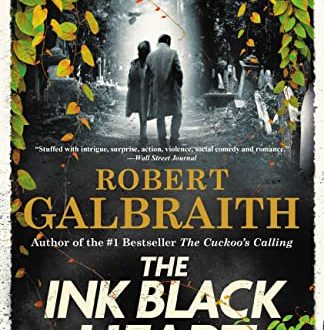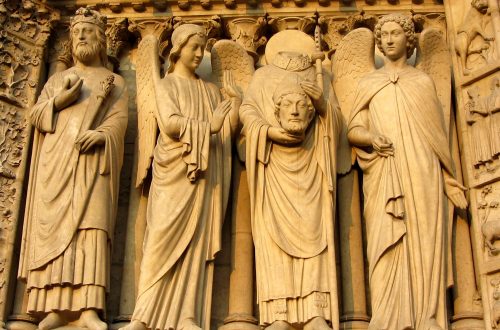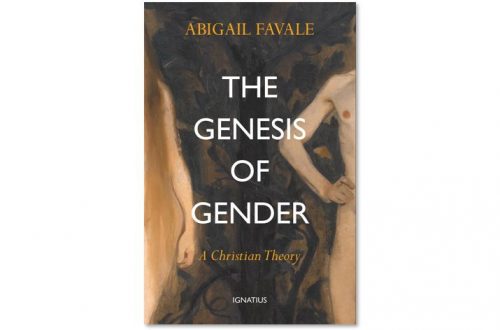 Zondervan will be releasing later this year a new book on homosexuality in their Counterpoints series—a series I appreciate and have recently contributed to. This new volume features two writers who believe homosexuality is not sinful and two writers who do. I have not read this book yet, but I am eager to see it as soon as it is available. Having said that, here are a few things to be watching for:
Zondervan will be releasing later this year a new book on homosexuality in their Counterpoints series—a series I appreciate and have recently contributed to. This new volume features two writers who believe homosexuality is not sinful and two writers who do. I have not read this book yet, but I am eager to see it as soon as it is available. Having said that, here are a few things to be watching for:
1. Framing Sexual Immorality as an Evangelical Option – The publisher’s description has a section that caught my eye:
Until recently most books fit neatly into two camps: non-affirming books were written by evangelicals and affirming books by non-evangelicals. Today, this divide no longer exists. Recent books written by evangelicals appeal to the authority and inspiration of Scripture as they argue for an affirming view. The question of what the Bible says about homosexuality is now an intra-evangelical discussion.
Again, I have not read this book yet. But the publisher says this book frames the discussion as an intra-evangelical dialog. This seems to suggest that one can be an evangelical Christian while affirming sexual immorality as a moral good. It seems to suggest that homosexuality is an issue over which faithful evangelicals can have disagreement and nevertheless still be considered evangelical. If the publisher’s copy is indeed borne-out in the book, that would be a whole new departure in evangelical works on this topic. It would not be a middle-of-the-road view. Framing the issue that way would give the “affirming” side what they always wanted. If not total agreement, it at least acknowledges that their views are within the pale. Such an impression would be quite misleading, but it is the impression left by the publisher’s description.
2. Are there enough views represented? – In the book Heath Lambert and I recently wrote, we identify at least four different “views” on the question of homosexuality: liberal, revisionist, neo-traditional, and traditional. This classification is important in our view because the Bible’s teaching is the central issue, not whether one is construed as “affirming” or “non-affirming” according to some non-biblical standard. Differences on this issue revolve around biblical authority and willingness to adopt revisionist readings. Additionally, the Bible’s teaching on sexual orientation is also at the center of this conflict. Both sides of the “intra-evangelical” debate affirm the Bible’s authority and its prohibition on homosexual behavior. The “intra-evangelical” debate between neo-traditionalists and traditionalists concerns the ethics of sexual orientation. Neither the liberal nor the revisionist approach can be in any way labelled as faithfully Christian, much less evangelical. The former denies the authority of scripture outright, and the latter denies it by distorting its message beyond recognition. In any case, these are meaningful distinctions, and as far as I can tell there is no one representing the “traditional” view in this volume.
3. “Affirming” vs. “Non-Affirming” – Related to the above, I am persuaded that the labels “affirming” and “non-affirming” frame the issue in a way that is already biased against what the church has always believed about homosexuality. When the labels are applied to questions of human identity, they sound as if one group likes gay people and the other doesn’t. The label “non-affirming” seems to imply animus against same-sex attracted people, while “affirming” seems to suggest openness and grace. This is an unfair and misleading way to frame this discussion, and it certainly is not a framing that originates with this book. Maybe this book will make better use of the terms than I have seen elsewhere, but I am obviously skeptical about that.
In any case, the book releases in November. Stay tuned.




11 Comments
Chris Taylor
Inevitable Slide: Evangelicals openly scorn patriarchy and have adopted a complementarity that affirms egalitarians as evangelicals, what else would you expect?
.
Related Slide: Will William Webb revise his seminal book? If not, he too will be left out of Zondervan’s four views series.
Luther Wesley
I am afraid that this is just one more step in the direction that makes ” evangelical ” a useless descriptor.
We to often forget in discussions like these that the Scriptures are clear and have been so for millennia on this topic.
Andrew Alladin
Denny: I looked up one of the “Affirming” side contributors (Megan DeFranza) on the Amazon page for the book and her LinkedIn page is quite insightful:
Summary
Megan DeFranza is a Christian theologian, author, speaker, and facilitator of challenging conversations especially around Christianity, sex, gender, and sexuality.
Author of “Sex Difference in Christian Theology: Male, Female, and Intersex in the Image of God,” (Eerdmans, 2015) as well a contributions to other books:
“Two Views on Homosexuality” (Zondervan, 2016, forthcoming).
“Intersex, Theology, and the Bible: Troubling Bodies in Church, Text, and Society” (Palgrave Macmillan 2015).
“Evangelical Postcolonial Conversations” (InterVarsity Press, 2014).
In all her endeavors she works to contribute thoughtful and humble reflections on the mysteries of God and human being in the hopes that, together, we can build a more just, reverent, and loving world.
Is there anything more than needs to be said?
This reminds me of the “Lordship Salvation” controversy/heresy awhile back. John MacArthur dropped Zondervan as a publisher due to them treating that heresy as up for debate – a controversy to be exploited for book sales. MacArthur did not see it that way and this heresy has died a rightful death.
Zondervan is at it again.
Thomas Womack
Thanks for the heads-up on this forthcoming book, Denny. A rather discouraging development, certainly.
Curt Parton
I would hope that evangelical scholars and leaders who have a relationship with Zondervan are vigorously expressing their deep concerns to them about legitimizing blatantly unbiblical views as somehow evangelical options. Appealing to the authority and inspiration of Scripture does not make one’s views evangelical. Would Jehovah’s Witnesses and Mormons be accorded this kind of validation as evangelical options simply because they appeal to the authority and inspiration of Scripture? Even if a position is held by sincere evangelicals, this doesn’t make it a legitimately evangelical option. Evangelicals can be sincere believers and still hold heterodox viewpoints after all. This is an extremely unwise and dangerous precedent.
Curt Day
Whether the issue of homosexuality is an intramural battle between evangelicals depends on which issue of homosexuality is being discussed. If the issue is whether we can support equal rights for the LGBT community and same-sex marriage in society, then I believe that the discussion can be an intramural discussion between evangelicals.
But if the issue is whether we can say that homosexual relationships are acceptable to God, then we moved out of the realm of an intramural contest to that a non-Christian vs Christian discussion. And by non-Christian, I am referring to the position taken by those who believe that homosexual relationships are approved of by God, I am not referring to the person making the argument.
Gus Nelson
Curt: By “support equal rights for the LGBT community and same-sex marriage in society” are you suggesting Christians can have differing opinions about how to interact with the secular realities? I am trying to understand your comment, but it doesn’t make much sense without more explanation.
Curt Day
Gus,
I am saying they can have differing views over an issue that does not define the faith because they have them. It’s an observation. There are religiously conservative Christians who support the legalization of same-sex marriage in society and equal rights for those in the LGBT community and there are those who don’t.
Dan Phillips
So, have Christian publishers replaced church councils now? Who approved the text on the book describing pro-perversion as a Christian or evangelical outline? What is his authority? On what authority does he base that rejection of a long-held, broadly-held, virtually-unquestioned position?
And where were you and I, Denny, when that vote was taken?
Peter Jones
Have you read Unchanging Witness by Fortson and Grams? An excellent study how the church has had one opinion on the issue of homosexuality. The also present an in-depth study of Romans 1:26-28, I Cor. 6:9, and Jewish and Greco-Roman views on homosexuality. It is book that is well worth the time and money.
Ted Weis (@TedWeis)
It’s very disappointing that a Counterpoints discussion on homosexuality would exclude the contribution of Robert Gagnon, whose Abingdon book, “The Bible and Homosexuality,” is the foremost work defending the traditional view of sexuality.